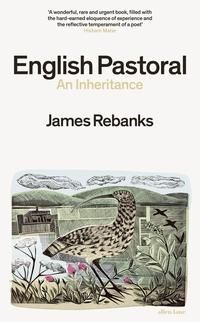English pastoral
an inheritance
av James Rebanks (forfatter).
Allen Lane 2020 Innbundet
Omtale fra forlaget
A stirring history of family, loss and the land over three generations on a Lake District farm. James Rebanks was taught by his grandfather to work the land the old way. Their family farm in the Lake District hills was part of an ancient agricultural landscape: a patchwork of crops and meadows, of pastures grazed with livestock, and hedgerows teeming with wildlife. And yet, by the time James inherited the farm, that landscape had profoundly changed. The men and women had vanished from the fields; the old stone barns had crumbled; the skies had emptied of birds and their wind-blown song.English Pastoral is the story of an inheritance: one that affects us all. It tells of how rural landscapes around the world were brought close to collapse, and how the age-old rhythms of work, weather, community and wild things were lost. But this elegy from the northern fells is also a song of hope: of how, guided by the past, one farmer began to salvage a tiny corner of England that was now his, doing his best to restore the life that had vanished and to leave a legacy for the future.This is a book about what it means to have love and pride in a place, and how, against the odds, it may still be possible to build a new pastoral: not a utopia, but somewhere decent for us all.
Bokdetaljer
Forlag Allen Lane
Utgivelsesår 2020
Format Innbundet
ISBN13 9780241245729
EAN 9780241245729
Genre Biografisk litteratur
Omtalt sted England
Omtalt person James Rebanks
Språk Engelsk
Sider 285
Utgave 1
Finn boka på biblioteket
Finner du ikke ditt favorittbibliotek på lista? Send oss e-post til admin@bokelskere.no med navn på biblioteket og fylket det ligger i. Kanskje vi kan legge det til!
Bokelskeres terningkastfordeling
4 2 1 0 0 0Bokomtaler
En høyst menneskelig historie om den siste jordbruksrevolusjonen, sett med øynene til de (tobeinte) nærmest jorda. Anbefales på det sterkeste til alle som spiser mat.
Alle som er opptatt av husdyr, miljø, og økologi bør lese denne. Mye å lære også for oss som bare er forbrukere.
Skriv en omtale Se alle omtaler av verket
Diskusjoner om boka
Ingen diskusjoner ennå.
Start en diskusjon om verket Se alle diskusjoner om verketSitater fra dette verket
The new farming had taken two mutually beneficial things - grazing animals and fertilizing fields - and separated them to create two massive industrial-scale problems in separate places. The farms with thousands of animals had more muck than their land could possibly accomodate, while the crop farms now had no animals, and thus no muck to fertilize plants, ...
Another of my father's best friends, Gerald, tells us that he stood on his highest field and looked across the Eden valley and realized recently that it is just a "green desert". He says there aren't birds like there used to be. And where are the hedgehogs? Where are the butterflies? The other men look uneasy. I am shocked to hear him talk like this. He sounds a bit like the environmentalists we once all hated.
While he was alive, it felt as if the old man had cast a spell on us all, making our way of life feel hopeful, decent and strong, like it would last forever. His unshakeable belief in it all made me think we could defy the outside world. I wore that belief like a protective cloak. I was a proud little Spartan.
"You are vulnerable if you farm just one thing, vulnerable to these insane swings in the prices of things. They tell you to get more cows, and want to lend you heaps of money, but when it goes wrong the bank comes for your farm and there is no sentiment. Don't trust them" he says.
My grandfather was rooted in work, connected to the soil and the crops and the animals upon it. I loved his closeness to the land. I was dimly aware that lots of people didn't live like us. Most families, even in our village, had traded in their relationship with the land for new lives away from the fields, birds and stars.
Legg inn et nytt sitat Se alle sitater fra verket
Bokelskere som følger boka
28 bokelskere følger dette verket.
Se alle bokelskere som følger dette verket

























